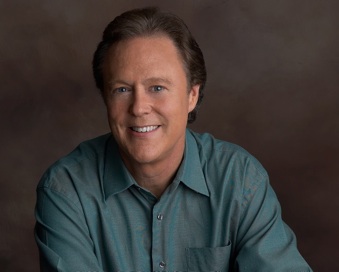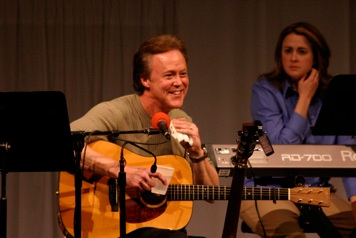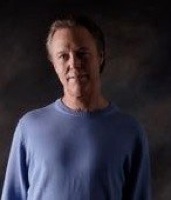I was recently introduced to Bill Leslie and his music when I was asked to review his newest CD, “Blue Ridge Reunion,” an album I immediately fell in love with. World-renowned cellist Yo-Yo Ma calls Bill “one of the greats in modern Celtic music,” but music is not Bill’s only career. Bill Leslie is also a television news anchor on WRAL in Raleigh, North Carolina who began his career in radio news with John Tesh! An incredibly gifted musician and all-around nice guy, I think you’ll enjoy this rather unique interview.
KP: First of all, congratulations on hitting #1 on the New Age Reporter charts for September 2008 with “Blue Ridge Reunion.” It’s an incredibly good album, and it’s great to see it getting the recognition it deserves! Let’s talk a bit about the inspiration for the album and its companion book.
Bill: Thank you very much, Kathy. The album and book are both a tribute to my dad who was a talented artist who painted mountain watercolors. My dad died suddenly when I was a teenager and I never had a chance to say “goodbye.” That has haunted me for years. By revisiting his favorite landscapes and hiking trails, working with his watercolors and other paintings I was inspired to write a batch of new songs along with essays and poetry for the book. My goal was to express with music and words what my father expressed with his paintings. The experience created a geyser of creativity and emotion which I tried to capture in the book and CD. It was truly a reunion of spirits – a Blue Ridge Reunion - and one that I will never forget. When the promoter of the album, Ed Bonk, called to tell me it had hit number one I couldn’t talk because my voice was choked with emotion.
KP: The book is equally stunning. I expected a soft-bound book, but it’s a gorgeous coffee-table style art book with 124 pages of paintings by your dad and poems, essays, and recollections by you. In a big way, it is the story of both of your lives during that period of time. It’s such a beautiful way to preserve your dad’s legacy as well as to bring closure for yourself. I would imagine that he’s looking down on you with a very big smile! Where can people find the book?
Bill: It was just released one week ago. Right now we're targeting it as a regional book. Most of the NC stores have it along with the various state museums in NC. I am going to make it available this week directly on my website at www.billleslie.com. If we sense a national interest we will pursue Amazon and Barnes & Noble but right now our book volume is so low (4,000 copies) that we're concentrating on the Southeast. We do have a wholesale distributor who can ship the book anywhere: Parnassus Books - lmendenhall@sc.rr.com
KP: It sounds like your roots in North Carolina run very deep. Have you lived there all of your life?
Bill: Yes, I am a Tar Heel born and bred! I did take a detour for nine months in Norfolk and three years in Houston shortly after college. I’m a University of North Carolina grad and a huge basketball fan.
KP: Some of the fans of your music may not realize that you are also a television news anchor for WRAL in Raleigh, NC. How did you get started in network news?
Bill: My broadcasting career began in high school. I wrote and recorded a song about a girlfriend. The record received airplay throughout NC and the Southeast. The experience put me in contact with lots of DJ’s, one of whom allowed me to read news late at night. I was immediately hooked on the business. Later in college at UNC, I befriended fellow broadcast majors Rick Dees and Ken Lowe. We became radio buddies and worked at the same stations. Dees went on to become one of the biggest names in radio. Ken was the guy who started both HGTV and the Food Network. They are still both very close friends. In fact, we spent the weekend together recently in the NC mountains. After winning some radio news awards, I was recruited to do television news
KP: Are you still doing a lot of environmental reporting? From reading your website, it sounds like you’ve covered a lot of really important environmental issues.
Bill: Yes, I’m still doing several environmental documentaries a year. Early in my television career, I was one of the first full-time broadcast environmental reporters in the country. I have a real passion for the issue. We have a beautiful state in North Carolina but we need to do more to protect water and air quality from the mountains to the coast.
KP: You have won a very impressive assortment of awards for journalism as well as for your music. Are you a perfectionist or is excellence something that’s in your nature and drives you?
Bill: My personal philosophy as a journalist is “to be fearless in the pursuit of truth.” I am a perfectionist if it is something I care deeply about. I am driven and highly competitive, but I also love to stop and smell the roses. That’s where much of my musical inspiration occurs – in those quiet and meditative moments.
KP: Do you have any favorite news stories that you’ve covered? Then we’ll get back to music - I promise!
Bill: My favorite documentary was “Troubled Rivers” which chronicled a host of pollution problems in NC. The program was the catalyst for corrective change in the NC state legislature on many fronts. “Troubled Rivers” was part of my ongoing environmental series ”Save Our Sounds” which won a George Foster Peabody Award, considered the Pulitzer Prize for broadcasters. One of the more interesting stories I covered was the Navy dumping plastic waste off the NC coast. Our cameras caught the illegal activity and I was summoned to testify before Congress on two different occasions.
KP: Wow! So you’ve really been able to go after the “big guys” and make a huge difference! How did you get started in music?
Bill: When I was 11, a little old lady tapped me on the shoulder during church and remarked: “Young man you have a nice singing voice. You should join the choir.” That was the first thing that got me going and then I learned to play various brass instruments in elementary and middle school bands along with the guitar.
KP: When did you write your first song?
Bill: 7th grade in the stairwell of my family’s home. The natural reverb of the setting was perfect for a lonely ballad.
KP: Which instruments do you play?
Bill: Cornet, baritone, even tuba early on and then guitar, Celtic whistle, bass and piano.
KP: You could be a one-man band! Do you still play any of the brass instruments?
Bill: I think I carried the tuba more than played it. That was the main requirement. I am sure I could get back into shape but it would take awhile.
KP: Do you record in a home studio?
Bill: Yes, I converted our attic into a studio. I do most of my recording there but I do the mixing at another studio.
KP: How did you become interested in Celtic music?
Bill: I visited Scotland while doing a television news series on North Carolina’s rich Scots-Irish heritage. I fell madly in love with the music and especially the sound of the Celtic whistle. In fact, I wrote a song about the experience. It’s called “Celtic Soul.” I recorded the song on Bragh Adair’s second album, “The Hunt.” The lyrics begin this way: “Steaming north on a stallion of iron up the Highland highway of steel, over bogs and bridges and heathery ridges and mountains so green they seem surreal. How strange to be in a foreign land and feel more at home than I’ve ever been. Where the lightning flashes and the thunder rolls, I have come to claim my Celtic Soul.” The second verse goes like this: “Oh, how wild and rugged this land. How sacred this place where I stand. It’s a feeling that burns in a heart that yearns to touch the very place of my people’s birth. Spirits of my ancient kin rise up to greet me on the wind.”
KP: Beautiful! Is Celtic music closely related to the folk music of Appalachia? A lot of your music just glows with “Americana,” so I’m wondering about the relationship of the two styles of music.
Bill: Yes, there is a definite connection. A lot of bluegrass music was born out of Celtic music though I wouldn’t consider my music bluegrass. It is more of a Celtic-folk fusion style.
KP: Who do you consider to be your biggest musical influences?
Bill: Micheal O’Domhnaill had more influence on me than anyone else. He founded the legendary Irish group called The Bothy Band. He also played guitar and whistle for a wonderful group called Nightnoise. Micheal died two summers ago and I dedicated my “I Am a River” album to him. When I first heard Micheal and Nightnoise play, I was totally overwhelmed with emotion. Eventually I realized I had found my so-called “inner gold” in their music and that I needed to push forward with my own compositions.
KP: What inspires you to write music?
Bill: Songwriting is a spiritual experience. I love the joy of birthing a new melody.
KP: What has been your most exciting musical experience to date?
Bill: Performing with the North Carolina Symphony and my band, Lorica, before 10,000 people in a televised concert near Raleigh two years ago.
KP: How did you and John Tesh end up as roommates after college?
Bill: John and I worked at the same radio station for about a year in Raleigh. I taught John how to run the radio console. We remain close friends today.
KP: Have you ever played music together?
Bill: I have played onstage with John several times and we always have a blast. He is a tremendous guy and a dear friend.
KP: Who are some of your favorite musical performers?
Bill: I think John Tesh puts on a great show. I love James Taylor. Allison Krauss is awesome. Plus, I love the Irish singer Cara Dillon. My favorite all-time band was Nightnoise and I still love to hear member Brian Dunning play. He has been very supportive of my music.
KP: Favorite composers?
Bill: Bach, Vivaldi, Micheal O’Domhnaill, Brian Dunning and John Gummoe.
KP: I’ve read that you’ve also performed and recorded with a couple of bands. Are the musicians who have played on your solo albums from those bands?
Bill: I played with Bragh Adair for several years but I haven’t worked with Kerry and Mary Johnson lately. Members of my current band have all played on my solo albums. These fine musicians are Sherry Lattin on violin, Marty Long on piano and vocals, Linda Metz on flute and Stephen Levitin on percussion. Violinist Jennifer Curtis has played a major role in all four of my solo albums. She is fabulous. Bill Covington is another brilliant musician. He has played piano on two of my albums and we are working on another one together now. My son Will is a top notch percussionist and he played a big role in “Blue Ridge Reunion.” I have also recorded with cellists Clark Wang and Susan Babini and Dan Gilvary on hammered dulcimer.
KP: You won two New Age Reporter Lifestyle Music Awards in 2005 for Best New Artist (“Peaceful Journey”) and Best Holiday Album (“Christmas In Carolina”). That’s going to be hard to top, but already you’re at #1 with “Blue Ridge Reunion.” Do you think you will ever leave television and just do music? Do the two pursuits satisfy different parts of your personality?
Bill: Good question. I think the two pursuits do satisfy different parts of my personality. The television news and reporting fulfill my analytical interests and the composing satisfies my creative side. I have worked for a wonderful family-owned television station (CBS affiliate WRAL) in Raleigh for many years and dearly love my association in the community as a journalist. I would continue doing both news and music if possible.
KP: Has being a television personality helped to open any doors for your music? Your music is so good that I’m sure it would have found it’s way without that, but do you think being known in one field has presented opportunities in the other? It’s also very possible that being known for one area could make it more difficult to be taken seriously in another. What has been your experience?
Bill: Early on, my television status helped me sell a few albums locally. People bought them out of curiosity more than anything else. I was worried when I took my music to the international stage, but thanks to a great promoter named Ed Bonk I found acceptance on a much broader scale. Locally, folks have embraced me warmly in both roles as newsman and musician.
KP: Ed is terrific. I enjoy working with him, too. Tell us about your family.
Bill: I’ve been married to the same beautiful woman for more than 30 years. Cindy is a speech therapist in the local school system. My daughter Lauren is in her second year as a first grade teacher and my son Will is a sophomore in college at Appalachian State in the beautiful North Carolina mountains.
KP: Will has played percussion on some of your albums. Does he plan to become a full-time musician?
Bill: I think he would like to but he is also interested in both broadcasting and public relations. Will has a great outgoing personality and I know he will do well in whatever he pursues.
KP: I’ve read that you’ve written a lot of hymns and religious music for your church. Are you a music director there?
Bill: I have written a number of pieces for my Presbyterian church but I am not the music director. Ha! My alarm clock goes off at 2:35 AM and I couldn’t stay up for those late choir practices!
KP: Yikes! That would be a problem!
To learn more about Bill Leslie and his music, visit
his website and check out his
Artist Page here on MainlyPiano.com.
Kathy Parsons
August 2008



